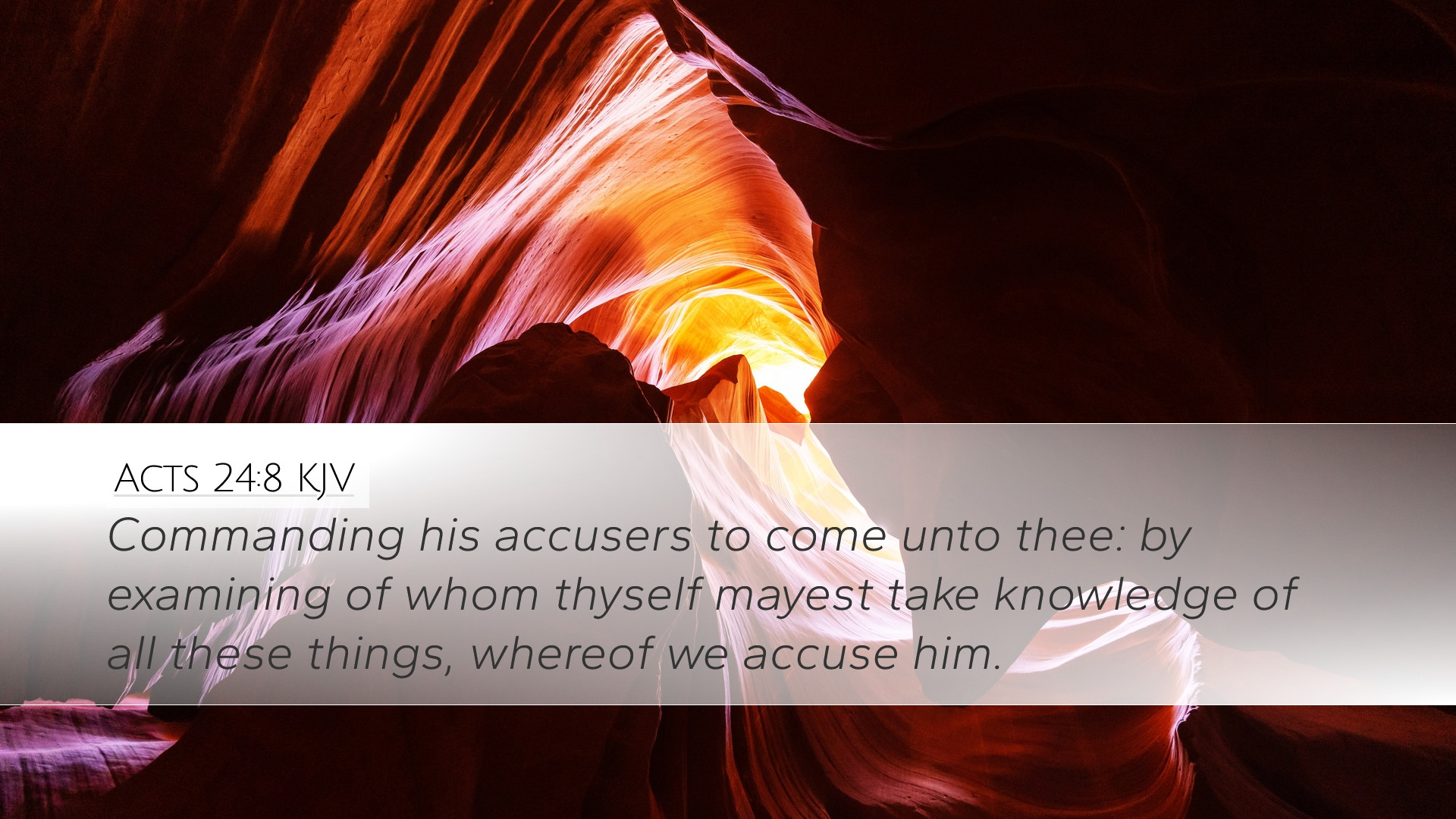Old Testament
Genesis Exodus Leviticus Numbers Deuteronomy Joshua Judges Ruth 1 Samuel 2 Samuel 1 Kings 2 Kings 1 Chronicles 2 Chronicles Ezra Nehemiah Esther Job Psalms Proverbs Ecclesiastes Song of Solomon Isaiah Jeremiah Lamentations Ezekiel Daniel Hosea Joel Amos Obadiah Jonah Micah Nahum Habakkuk Zephaniah Haggai Zechariah MalachiActs 24:8
Acts 24:8 KJV
Commanding his accusers to come unto thee: by examining of whom thyself mayest take knowledge of all these things, whereof we accuse him.
Acts 24:8 Bible Commentary
Commentary on Acts 24:8
Verse Text: "Commanding his accusers to come unto thee, and stating before thee the things whereof we accuse him."
Contextual Background
The verse found in Acts 24:8 occurs in a significant narrative within the book of Acts, which details the early church's expansion and the adversities faced by its leaders. Paul the Apostle, after his arrest in Jerusalem, is presented before Governor Felix in Caesarea. This setting is crucial as it demonstrates the shifting political and religious tensions of the time.
Commentary Insights
Matthew Henry's Commentary
Matthew Henry emphasizes the nature of Paul's situation with respect to his accusers. He notes that the accusers brought forth their charges but fail to substantiate them with credible evidence. Henry elaborates on the integrity and resilience shown by Paul during this trial, highlighting how he stood firm in the face of false accusations.
- Character of Accusations: Henry suggests that the accusations against Paul were of a political nature, meant to stir up unrest among the Roman authorities against a supposed threat to the peace.
- Divine Providence: He considers Paul's innocence and how God's providential hand was at work, guiding him through this challenging time.
Albert Barnes' Notes on the Bible
Albert Barnes provides a more legalistic perspective of the proceedings in Acts 24:8. By emphasizing the procedural elements, Barnes highlights the importance of a fair trial, a principle that appears to be threatened in this scenario.
- Right to Defense: Barnes notes that Paul was afforded the right to defend himself, commanding the accusers to present their case directly before the governor, which underscores the legal standards of the time.
- Accountability of Accusers: He points out that there is an expectation of accountability from those who bring forth accusations. This serves as a reminder of the biblical principle that one must not bear false witness.
Adam Clarke's Commentary
Adam Clarke delves into the nuances of the text, providing historical and linguistic insights. His approach helps enhance the understanding of the passage by connecting it to broader themes within Scripture.
- Historical Context: Clarke discusses the sociopolitical climate of Judea and its implications for Paul’s mission and ministry. The tensions between Jewish customs and Roman law are particularly relevant here.
- The Role of Felix: He emphasizes the role of Felix as a mediator, representing both the legal authority and the moral ambiguity present in Roman governance.
Theological Reflections
Acts 24:8 presents profound insights for contemporary readers, especially for those in pastoral and theological contexts.
The Nature of Justice
This verse underscores the essential biblical principle of justice. The expectation for accusations to be substantiated prompts reflections on the nature of justice in our own legal systems and communities.
Faith Under Trial
Paul's example serves as an encouraging template for believers facing trials. His steadfastness in defending his faith amid false accusations represents a model for maintaining one's integrity.
Importance of Integrity
Ultimately, the integrity with which Paul approaches these accusations challenges readers today to uphold truth in their own lives. The pursuit of justice is fundamental, and those in positions of authority are reminded of their duty to seek the truth rather than simply passing judgment on appearances.
Conclusion
Acts 24:8 encapsulates critical themes of justice, integrity, and the challenges of witnessing for the Gospel. The combined insights from the commentaries of Henry, Barnes, and Clarke offer a rich tapestry of understanding, inviting deeper engagement with the text and its implications for modern believers.


